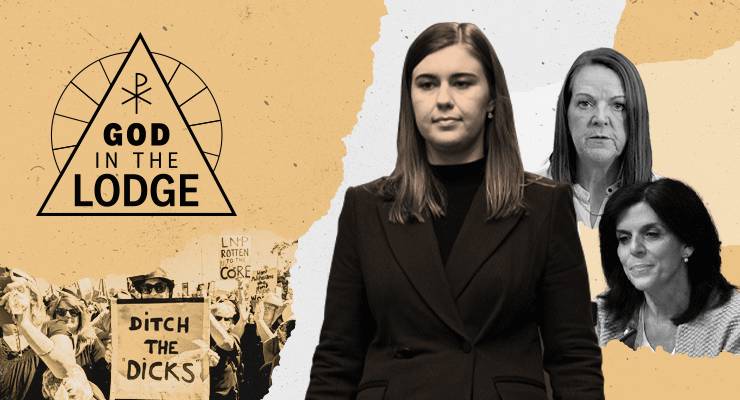
This story is part eight in a series. For the full series go here.
The prime minister’s struggles with gender equity are such that he earned The New York Times’ accolade of “manterruption of the year” for talking over a female minister when she was asked about how things are for women in Australia’s Parliament.
It’s all part of a now well-known pattern that has seen his approval levels drop among women. Other examples? His need to consult his wife, Jenny, on how to respond to allegations of rape in Parliament House by Liberal staffer Brittany Higgins.
He referred to Professor Alison McMillan as “chief nurse Alison” while reserving the title of “professor” for chief medical officer Paul Kelly. Such awkwardness in recognising the seniority of a female professional is reflected in Julia Banks’ account of a fellow MP warning: “He doesn’t really like or understand women like you and me, women who have worked in a profession and who have children.”
Morrison has left observers speculating about how his Pentecostal roots might affect his stances on matters as various as climate change, election results, economic policy and social welfare. Less attention has so far been paid to gender. Yet the Hillsong/Australian Christian Churches (ACC) strand of Pentecostalism has attracted a substantial scholarly literature on its deeply binary, stereotype-laden gender ideology.
Morrison and his family were long-term attenders of Sydney’s Hillsong city campus, and in his first speech to Parliament he acknowledged two Hillsong leaders: senior pastor Brian Houston and controversial pastor/entrepreneur Leigh Coleman.
Over the years, Brian Houston and his wife, Bobbie, have clearly articulated the requirement for men to “lead” and women to “submit”. More recently, Pentecostal theology has devoted considerable attention to women’s leadership. Students at Hillsong College today are taught that Christians can hold a variety of views about “headship”, the idea that a man is the God-ordained head in any married couple (there is always one man — heterosexual marriage definitely does not accommodate a variety of views). Women, however, tend to lead women, or serve as half of a “pastor couple”. The ACC’s national executive board has one woman and eight men; the Hillsong global board has one woman and nine men.
Bobbie Houston leads Hillsong’s vast women’s ministry. Its annual conference, Colour, is held in Sydney, London, Cape Town, New York, Los Angeles, Kiev and Moscow. In 2020, and just before lockdown, the Sydney iteration ran twice, selling out the 8000-seat ICC First State Theatre each time. Reaching far beyond Hillsong’s congregations, the events attract women from across the evangelical-Pentecostal world.
There they encounter the fruit of Bobbie Houston’s often-recounted founding vision: “I once felt heaven whisper in my ear: ‘Tell women that there is a God in heaven who believes in them, and a company of others who believe in them.’ “
She characterises her female audience with terms like “captivating”, “entrancing”, “irresistible”, “tender”, “soft”. She and other women’s leaders address female audiences as “girls”, “girlfriends”, “girly-girl” and even “baby girl“. Colour is advertised through leaflets and web pages that look like a resort wear fashion shoot, with extra frills.
Hillsong-aligned theologian Tanya Riches describes midweek Sisterhood meetings in Sydney as “the ‘bedrock’ of Hillsong women’s ministries”. The program was designed “for mothers”, but “increasingly … includes businesswomen”, and is “attended by all-female staff”. A regular described how Sisterhood meetings begin with 30 minutes of coffee, snacks, chat, getting your nails done, hair, make-up, or a massage (all provided by volunteers), before moving into praise and worship, the ubiquitous call for donations, and then a women-specific “message” from Bobbie or another woman leader, such as “how to be a Proverbs 31 woman”, (a “wife of noble character”).
Meanwhile, Australia’s Hillsong men were summoned in 2019 to a men’s event advertised in khaki. The Monthly’s Lech Blaine described a sweaty atmosphere of “Meat your Maker” burgers and “pre-Brian entertainment” in which “a BMX rider risks serious injury in ‘The Cage of Courage’, a see-through sphere of daredevilry”, while a spruiker barks: ‘Who reckons we can put another rider in the cage? … What we are about to attempt is highly dangerous!”
Men at Hillsong UK are invited to join an “Xtreme Character Challenge“, or XCC, “an active and challenging endurance event for men out in the wild”. The promotional video shows men lugging backpacks, shouting, hurling rocks, hugging, and pounding mud. Meanwhile, the men’s weekly Sydney meetings, Hillsong Men, are preceded by barbecuing, basketball and sometimes videogames.
Women’s and men’s ministries rely heavily on volunteers, much of it provided by students from Hillsong College. One student, who did not want to be named, said the church’s prescriptive view of gender is “a conversation often had among college students”. Sisterhood, the students felt, is “a one-type-of-woman place”: Sisterhood’s woman “loves colours, flowy clothes, being pampered”.
The student said that although “there’s nothing wrong with” enjoying these highly gendered formats, women and men who “don’t fit” those stereotypical kinds of femininity and masculinity may experience them as alienating, and even, in the case of staff and students who are required to be there, “unsafe”.
The question for the broader Australian public is how Hillsong’s culture of girly-girls and daredevil men might underlie at least some of the tensions that have beset the nation over the past year under the prime ministership of Scott Morrison.








As an 80 year old Australian-born woman, of two immigrant parents, I find it difficult to read this and remember that it is 2021. I had hoped that we had left these archaic attitudes behind decades ago.
I find it all utterly depressing – though I do have some hope when I see the bravery of young women like Grace Tame and Brittany Higgins.
Left to our wholly inept prime minister and the demands of the happy clapping religions, It won’t be long before this country becomes some sort of a cross between “Brave New World” and “The Handmaid’s Tale”.
The brave women you mentioned will be the ones to make good the damage done by these inept men .All power to them . I would like to see them join the two brilliant independents Helen Haines and Zali Stegall at the upcoming election.
Higgins?
Who remained schtumm for two years in return for career preferment?
She only spat the dummy when unable to secure preselection for a safe Liberal seat, as is the rite of all entitled, young things.
More balls than you annon
This suggests what we already know: Morrison’s most significant problem with women is with “respect as an equal person”. This explains why he has trouble relating to the Julia Bankses of his political world and with changes to legislation on “consent” that will require men to relate sexually to women as equal persons. This requires men not to force themselves on women in all the ways that deny them respect as equal persons. Having no expectations of the Coalition on this front fits in with all the lack of action on any issue of importance to the future of Australians that we have come to expect as par for the course of Morrison’s Coalition government. To paraphrase Henry II, will our electors never rid us of this troublesome government? Grab the chance at the next election.
I prefer Cromwell’s exhortation to the Rump Parliament – “…just go!”.
Ron Brierley has just been sentenced to 14 months jail for possession of child porn. One down, thousands to go. How can Scott Morrison, a very senior Australian politician not see the danger that women and children face every minute of every day in a society where ‘powerful males’ rule? Morrison should resign.
Yes, and Hillsong has proven its credentials as a christian religion by having a sex scandal as well.
One suspects that Morrison and his fellow Pentecostals would be happy if women didn’t have the vote at all. Women of Australia, enjoy your emancipation while you still can, and if you think I exaggerate (I do; a little), then take a look at what’s happening in Texas. That wedge isn’t at the thin edge any more.
Nearly all scientifically minded people know that religions are man made bollocks. Yet our societies still have to put up with the mumbo jumbo that adherents to these delusions pester us with continually. Time should slowly erase them and we have to be grateful people are not being burnt at the stake.
All this stuff is so medievally tiresome. When will humanity break free from all this superstitious claptrap from the past.
Tell that to 60 million American Evangelicals who may help the ‘Evil one’ Trump get elected again in 2024.
The mind boggles but those deluded people would probably prefer a dictator as long as he/she was one of them.
Trump, a famous philanderer, isn’t one of them but has garnered their support.